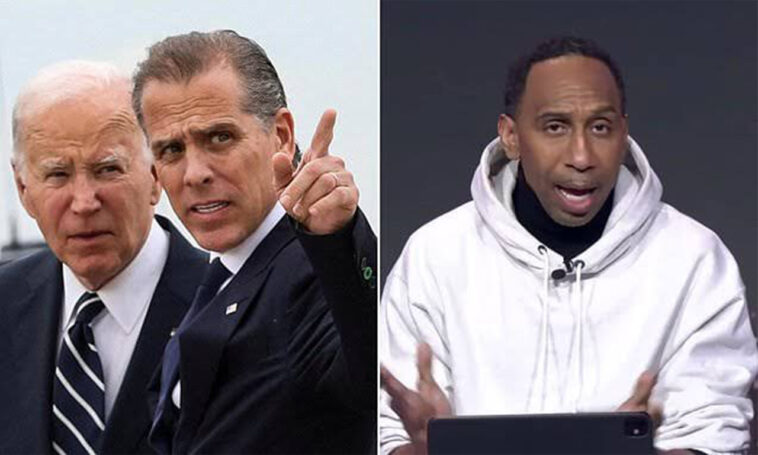Stephen A. Smith sharply criticized President Joe Biden for his decision to pardon his son, Hunter Biden, just weeks before leaving office, accusing him of dishonesty and inconsistency. The president’s decision, which came after Hunter was convicted on charges stemming from two separate federal cases, stirred significant controversy. The pardon applies to any offenses Hunter may have committed between January 1, 2014, and December 1, 2024.
On the latest episode of The Stephen A. Smith Show, Smith wasted no time diving into his critique of Biden’s actions, opening with a scathing comment aimed directly at the president.
“Respectfully, to the president of the United States, specifically as it pertains to that statement, you’re full of it,” Smith declared. “I’m going to look right here, over the national airwaves, and look the president of the United States in the face and say, ‘You’re full of it.’”
His frustration centered not around Biden’s choice to pardon his son, but the reasoning given for it.Smith acknowledged that he understood the emotional side of the decision. He expressed no qualms about a father wanting to protect his son, especially when that son has battled addiction. “You’re damn right you should let him off. He’s your son, and he’s a recovering addict, and he’s battled those demons for years,” Smith said, adding that Trump would have done the same for his children. However, it was Biden’s public justification that irked Smith. He felt the president’s statement was disingenuous and evasive.
Smith took issue with Biden’s claim that Hunter had been “treated differently” due to political motives. Biden argued that Hunter’s legal troubles were politically driven by his opponents, who allegedly orchestrated the charges to attack him and undermine his election chances. He further contended that a plea deal, negotiated by the Department of Justice, unraveled because of political pressure, which he believes was a concerted effort to punish his son. “No reasonable person who looks at the facts of Hunter’s cases can reach any other conclusion than Hunter was singled out only because he is my son and that is wrong,” Biden said in his statement.
Smith was unconvinced by this explanation. He pointed out the timing of Biden’s pardon: it came after the election, when Biden’s political position was secure, and just ahead of Donald Trump’s imminent return to the political scene. “You didn’t talk about this then. As a matter of fact, you specifically said you wouldn’t pardon your son … before the election. You’re announcing it now that we know Donald Trump is coming in and about to be sworn in as the 47th president,” Smith observed, implying that the timing was not coincidental. Smith also accused Biden of misleading the public about his intentions prior to the election. “You were intending to do this all along, which again is no problem. But it doesn’t make you any less full of it.”
Smith’s comments reflected a broader frustration with what he sees as double standards in the political system, especially with regard to how Hunter Biden’s legal issues have been handled. He emphasized that Biden’s actions contradicted earlier statements and undermined his credibility. “You’re telling the American people there was no way you were going to pardon him, when everybody and your grand mama knew you were lying and didn’t hold you accountable for it,” Smith argued. “And now you’ve confirmed what people believed you were probably going to be lying about.”
Despite the criticism, Hunter Biden issued a statement expressing gratitude for his father’s decision, vowing to use the opportunity to help others struggling with addiction. He acknowledged his past mistakes, which he said had been weaponized by political opponents to humiliate him and his family. “I have admitted and taken responsibility for my mistakes during the darkest days of my addiction – mistakes that have been exploited to publicly humiliate and shame me and my family for political sport,” Hunter wrote.
Stephen A. Smith’s outspoken criticism of President Biden highlights a deeper conversation about the intersection of family, politics, and justice. While Smith expressed empathy for Hunter Biden’s struggles, he also called out the president for what he perceived as a lack of transparency and integrity. In the end, Smith’s commentary serves as a reminder of how personal decisions particularly those of public figures can be scrutinized through the lens of political strategy and public perception.






Join the Community and Be a Part of the Conversation
You must be logged in or registered to post a comment.